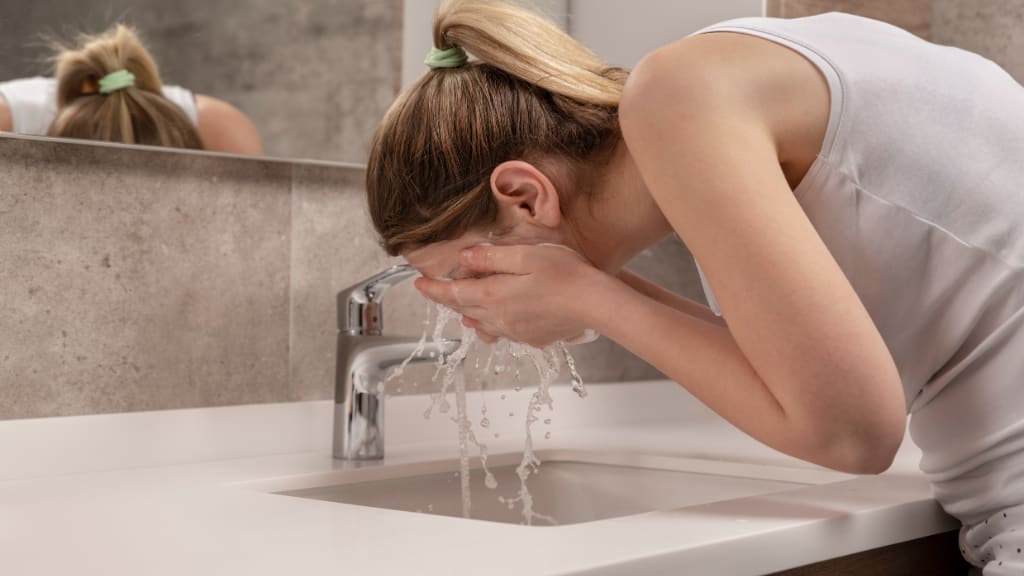How does hard water affect your skin and eczema?
The impact of hard water on your skin health

Did you know that hard water can affect your skin? People who experience skin problems, such as dryness, or are conscious about the skin, may not realise how damaging hard water can be. We cover how hard water affects both skin and eczema, alongside what you can do about it.
What is hard water?
Hard water is classed as hard based on the mineral content of the water. Water becomes hard with the addition of minerals, such as calcium and magnesium. The rigidity of water is no different to soft, with the differences being at the molecular level.
Sedimentary rocks, such as chalk and limestone, are the cause of hard water. Through the weathering process, water gathers the minerals that make it hard. To begin with, rainwater is naturally soft.
The water vapour that results from the evaporation of water from the planet’s surface rises into the atmosphere. Once in the atmosphere, the water vapour cools to form very tiny water droplets. It is the water droplets that help in the formation of clouds.
As the water drops are tiny, they can stay up in the Earth’s atmosphere. Over time, precipitation turns smaller water droplets into larger and heavier drops. When the drops become too heavy, they fall back to Earth as rain.
It is here that water becomes hard. Rainwater that falls onto the sedimentary rocks causes them to dissolve. Water percolates through the rocks, causing the rocks and minerals to dissolve. The minerals are deposited into the water thereby causing it to become hard.
When rainwater falls onto less porous rocks, such as granite, the water remains soft. That is because none of the minerals has dissolved into the water before entering our water supply. Regions such as Wales, Scotland, and Northern Ireland have soft water supplies as a result.
Hard water in the UK
Around 60% of the UK’s water supply is classed as hard. The hardness of water can be measured by the mineral content, or calcium carbonate, present in the water. A hardness of between 201 and 300mg/l is considered hard, while anything over 300m/l is very hard.
Hard water is mostly found in the South and East regions, where the water supply comes from chalk and limestone heavy areas. These countries have the hardest water supplies in the UK:
• Bedfordshire
• Buckinghamshire
• Essex
• Gloucestershire
• Hertfordshire
• Oxfordshire
• Sussex
• Wiltshire
Use this map to discover water hardness across the UK.
Hard water in itself is not typically a problem. However, the minerals present in hard water can lead to a multitude of problems. If hard water is left untreated, scale build-ups occur. You cannot judge whether water is hard of the effects purely through observation.
However, these signs can be good indicators:
• A film-like feeling on your hands after washing
• Spots and marks left on dishes and glassware
• Stains around water outlets in the kitchen and bathroom
• Lower water pressure
• Scale deposits inside your kettle
When hard water is heated, the mineral ions begin to solidify and attach to the nearest solid surface. The result is calcium carbonate (or limescale). This can lead to pipes becoming clogged up, heating systems becoming less efficient, and appliances’ lifespan reduced.
The minerals in hard water can also lead to problems with both our skin and hair. Hair can become rough, dry, and faded. Hard water can also cause dandruff, and an itchy and dry scalp. Hard water can also be a problem for our skin and those suffering from eczema.
How does hard water affect the skin?
Drinking hard water does not pose any serious health problems. The mineral content of hard water can be beneficial and contribute towards our daily recommended mineral intake of calcium and magnesium.
However, washing with hard water can cause serious problems with our skin’s health. Skin can become extremely dry, itchy, irritable, or sore. One reason for this is that the mineral content of hard water disturbs the pH balance of our skin.
Our skin has a naturally acidic pH. If you were to look on the pH scale, our skin would fall somewhere between 4 and 6 (ideal around 5.7). Exposed areas, such as the face and arms, will have a slightly higher acidity compared to less exposed areas.
One of the factors that affect our skin’s natural acidity is sebum. Sebum is the natural oil our skin produces to moisturise and protect our skin. Hard water affects sebum production which can lead to problems with our skin.
The calcium present in hard water build-ups and develops a soap scum layer of film on our skin. When this happens, our skin pores become blocked or clogged, making it difficult to wash off any excess sebum build-up.
This can happen on our scalps and skin, causing problems with our hair and skin. When the pores of the skin become blocked, skin can become dry, irritable, and sore. The sebaceous pores will produce more oil to keep the skin moisturised.
As the soap scum film blocks pores, sebum oil fails to keep our skin naturally moisturised. An excess of oil also changes our skin's natural pH, which can lead to acne and breakouts. The oil production in our scalp is also affected, resulting in dry, flat, and frizzy hair.
Does hard water cause eczema?
Research has also indicated that areas with hard water have experienced amplified eczema conditions. Due to the dysfunction of the skin barrier in keeping the skin properly moisturised, eczema conditions such as inflammation of the skin are worsened.
Skin can become cracked and irritable with eczema too. Hard water also alters the skin's natural pH from acidic to alkaline, causing further damage to our skin. The skin barrier damage leaves those with eczema open to bacteria and infection. This worsens eczema conditions too.
There may also be an indication that hard water can lead to the development of eczema. Further research has discovered that exposure to the minerals in hard water can contribute to the development of atopic eczema (the most common form of eczema) in children.
How can you protect your skin from hard water?
If you experience the skin problems outlined above, now may be the perfect time to act and keep your skin healthy and moisturised. Many people may purchase moisturised or other products to try and keep their skin healthy.
However, the underlying problem is not addressed. Purchasing such products may only work as a short-term solution. Instead, finding a suitable solution to adjusting the water can help save you money and keep your skin permanently healthy.
Consider installing an electronic water descaler. These small devices are attached to the main water inlet by wrapping coils of wire around your water pipe. The descaler device emits an electromagnetic signal to the coils and through the water pipe.
The signal then alters the behaviour of the mineral ions so that they do not become a problem forming scale build-ups or developing soap scum films on the skin. This solution is particularly suited for those experiencing inflamed eczema conditions because of hard water.
These devices can be easily and conveniently installed. After installation, they can be left without requiring any attention. The device does all the hard work for you. Water descalers do not remove the minerals in hard water like water softeners, instead alleviating the problems caused.
Discover more benefits you can gain from an electronic water descaler.
A water descaler could be the perfect solution for those who experience dry, itchy, or irritable skin. Those who experienced inflamed eczema because of the minerals in hard water will find a descaler solution particularly beneficial. With a little cost and minimal maintenance, they are the easiest and long-term solution to combating hard water problems.





Comments
There are no comments for this story
Be the first to respond and start the conversation.